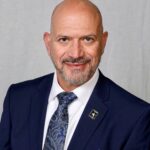 As I write this article, I have just returned from the AADSM meeting. I enjoyed reconnecting with old friends and making many new ones. However, it was challenging to find adequate time to answer all the questions which came rapid fire from every direction. Not that I mind answering questions, obviously that is not the case or I would not be writing this column. However, I admit it, sometimes I do get tired of answering the same questions over and over. Since, there does seem to be recurring themes, I thought that I would attempt to cover several topics that do not warrant a full article devoted to them. I apologize in advance for the lack of continuity on display. However, using this approach I will attempt to cover a lot of territory in this one article.
As I write this article, I have just returned from the AADSM meeting. I enjoyed reconnecting with old friends and making many new ones. However, it was challenging to find adequate time to answer all the questions which came rapid fire from every direction. Not that I mind answering questions, obviously that is not the case or I would not be writing this column. However, I admit it, sometimes I do get tired of answering the same questions over and over. Since, there does seem to be recurring themes, I thought that I would attempt to cover several topics that do not warrant a full article devoted to them. I apologize in advance for the lack of continuity on display. However, using this approach I will attempt to cover a lot of territory in this one article.
Terminating Treatment
“What should I do if a patient leaves my practice in the middle of treatment?”
A dentist is obligated to discuss with a patient the treatment being recommended and any reasonable alternatives that exist. That disclosure allows the patient to make an informed decision concerning the treatment that he or she will receive. This information sharing is all part of informed consent. That same philosophy should be followed if a patient decides to abandon a course of treatment that has already begun (or refuses to accept any treatment). In such cases, the dentist should provide the patient with a description of the potential risks and consequences of failing to treat OSA. This disclosure should include any reasonable risks to the patient’s health including, high blood pressure, stroke, heart attack, dementia, motor vehicle accidents, etc. Once the patient is informed of the seriousness of untreated OSA, the patient has the legal right to refuse treatment or discontinue treatment at any time. Where treatment is refused or discontinued, the dentist should make sure that the patient’s record reflects the advice given, including any health warnings or risks that were relayed to the patient. The record should reflect that the patient was fully informed of the potential risks of refusing treatment and therefore made an “informed refusal” of treatment. For OSA patients, the dentist is further obligated to make sure that the patient is referred back to his or her sleep physician or PCP for alternative care.
“What do I do if the patient refuses to follow protocol?”
This question typically arises in the context of patients refusing to go for a final PSG or complying with recall instructions or appointments. AADSM Practice Parameters 2006 states:
3.4.2 To ensure satisfactory therapeutic benefit from OAs, patients with OSA should undergo polysomnography or an attended cardiorespiratory (Type 3) sleep study with the oral appliance in place after final adjustments of fit have been performed.
I think we all agree, it is best if our patients return to the sleep lab after in-office titration for a final PSG where the MAD is further titrated for maximum medical improvement. Unfortunately, many patients do not enjoy the friendly confines of the local sleep lab and are resistant to comply with this recommendation. As stated previously, the patient should be fully informed of the protocol for the treatment of OSA utilizing Oral Appliance Therapy. The patient should be made aware of the medical and other benefits of a final in-lab titration to achieve the best results of MAD therapy. However, if after being fully informed of the risks and rewards associated with refusing to attend a final in-lab PSG, you should then document the patient’s informed refusal. You should list the risks and benefits which were shared with the patient before refusal. This list should include the fact that the patient’s MAD may not be adequately titrated due to the patient’s refusal to follow protocol. In my office, I involve the referring physician. I send a letter informing the physician of the refusal and I ask the sleep physician to send the patient a letter or call the patient and explain the need for a final PSG. Rarely do I have a patient stubbornly refuse to comply after the benefits are adequately explained.
3.4.3 Patients with OSA who are treated with oral appliances should return for follow-up visits with the dental specialist. Once optimal fit is obtained and efficacy shown, dental specialist follow-up at every 6 month is recommended for the first year, and at least annually thereafter. The purpose of the follow up is to monitor patient adherence, evaluate device deterioration or maladjustment, evaluate the health of the oral structures and integrity of the occlusion, and assess the patient for signs and symptoms of worsening OSA.
I personally take the recall of my patients very seriously! It is amazing how frequently at a recall appointment I discover that the patient is no longer completely compliant with my treatment. Yet, we struggle to get our patients to comply with recall. When a patient does not return for recall, we make at least three different attempts to reappoint that patient. We go to great lengths to explain the necessity of recall to insure the fit, function and effectiveness of our treatment. However, after the patient is fully informed, they have a legal right of self- determination. The patient can refuse your attempts at recall. These attempts to appoint the patient must be well documented with the response of the patient included in your notes. After the patient is fully informed and the “informed refusal” is documented in your records, send the patient’s sleep physician a letter explaining that the patient has removed himself from recare. Be sure to send the patient a copy of the letter.
Our office makes final PSG’s and recalls such a big deal we rarely have a patient refuse. This past year I only had one patient refuse a final PSG.
HST Ownership
“Will I lose my house if I own HST equipment?”
The short answer is NO! Despite what you may have experienced at the AADSM, I have been involved in numerous hearings before different state boards and if discipline or sanctions are imposed, it never involves the loss of your home. First, if a treatment or condition falls broadly within the definition of the practice of dentistry, there is a legal presumption that you can explore any means within your expertise to treat that condition. As I am sure you are aware, very few state dental boards have taken up the subject of HST. Therefore where HST usage has NOT been addressed, you have a legal right to assume that HST usage is not illegal until such time that your state board determines otherwise. However, if you practice in Oregon, Georgia, Connecticut, New Jersey, New Hampshire, Alabama or Virginia, your state boards have taken some action or published an opinion on the treatment of OSA or HST usage. The next question is how are you using your HST equipment? In my office I utilize both HST and High Resolution Pulse Oximetry to screen and titrate. I do not order diagnostic home sleep testing in my office, nor do I employ a remote Sleep Physician who has not seen the patient to provide a diagnosis. Not because it is illegal for me to do that, but because it would make the sleep physicians that I work with mad. Additionally, I would be accepting all the risks of treatment. Personally, I want to share liability with other healthcare providers, therefore, I would never treat an OSA patient without the involvement of a physician. When I screen patients for OSA, I always refer those patients to a local sleep physician. This allows for a good working relationship with the Sleep Physicians in my area. I refer to the local sleep physicians and they reciprocate. Yes, this arrangement is a “quid pro quo” but it is not illegal. If I refer patients to local sleep physicians for diagnosis and treatment, I then routinely receive referrals of CPAP intolerant patients for OAT. If I were using HST for diagnosis, it would jeopardize this relationship. I’m not going there!!!
Now let’s briefly discuss the new Georgia Dental Board ruling. It states:
Depending upon the diagnosis of the type and severity, one possible treatment option for obstructive apnea is the use of oral appliances. The design, fitting and use of oral appliances and the maintenance of oral health related to the appliance falls within the scope of practice of dentistry. The continuing evaluation of a person’s sleep apnea, the effects of the oral appliance on the apnea, and the need for, and type of, alternative treatment do not fall within the scope of dentistry. Therefore the prescribing of sleep apnea appliances does not fall within the scope of the practice of dentistry. It is the position of the Board that a dentist may not order a sleep study. Home sleep studies should only be ordered and interpreted by a licensed physician. Therefore, only under the orders of a physician should a dentist fabricate a sleep appliance for the designated patient and conduct only those tasks permitted under O.O.G.A. Title 43. Chapter 11.
When you look at the Georgia Rule in its entirety, a number of things jump out. First it attempts to define not only the scope of practice for dentists, but also the scope of practice for physicians. This is an obvious overreach. With that aside, the one thing that is certainly clear is that a dentist cannot provide Home Sleep Testing in his office which is read by a remote Sleep Physician and then fabricate a MAD without any other involvement by a physician. From a risk management strategy, if any readers are routinely employing this type of model where they are performing HST and providing OAT without a prescription from a physician, you are putting yourself in a position of significant risk. DON’T DO THAT! With that said, this paragraph is very poorly drafted and creates a great deal of uncertainty. If I read this statute literally, which attorneys are taught to do, it seems to state that it is not illegal to utilize HST in the state of Georgia in some circumstances. This statute states that a dentist cannot order a sleep study utilizing HST. By definition a sleep study is for the diagnosis of OSA and not for patient screening or oral appliance titration. So the question is: “Can a dentist in Georgia utilize HST equipment for the titration of oral appliances?” My answer would be YES. When oral appliances are titrated, most dentists do not send this data to a sleep physician for scoring and the data is not being utilized to diagnose the existence or severity OSA. Computer scoring is typically utilized, therefore, I would argue that a titration study does not meet the definition of a “sleep study”. If the board wanted to ban ALL usage of HST that statute would have been simple to draft. The wording of this statute does not ban the ownership of HST equipment or the utilization of HST for titration of Oral appliances. The Georgia Board of Dental Examiners chose not to incorporate verbiage banning all HST ownership. This statute prohibits a dentist from ordering a diagnostic home sleep test only. In my opinion the verbiage of this poorly drafted statute certainly opens the door for legal interpretation and confusion.
As a side note, I personally feel that this statue would not withstand a legal “constitutional” challenge. Not because the board does not have the legal authority to limit the use of HST, it certainly does, but, this statute is so poorly written a Judge would likely throw it out as ambiguous.
Informed Consent
“Does consent have to be in writing?”
I am aware that some lecturers in Dental Sleep Medicine routinely declare in lectures that verbal informed consent is a breach of the “standard of care”. That is a common misconception among healthcare providers. You should know the standard of care is determined by law not by the misinformed lecturers. Sadly as a result, there is still confusion in the area of informed consent. Frequently, I am asked about whether “the law says that consent has to be in writing?” The Law of informed consent has been settled for many decades. Under the Law, Informed Consent generally DOES NOT have to be written. Now before you go nuts, you need to be aware that each state has statutes and case law that list certain procedures where consent MUST be in writing. The types of medical procedures that are historically found in these state statutes are: procedures that could result in the sterilization of the patient; breast biopsies, in vitro fertilization, and HIV testing. All other medical procedures can be verbal. That is the LAW! However, you should be aware that in this day and time, juries expect consents to be in writing. While that is not the law, it certainly the perception of juries. Therefore, from a risk management prospective, consents should be in writing! It is my experience that if you do not have a written consent when a plaintiff’s attorney reviews your records, you will likely be sued! Most plaintiff’s attorneys do not know if you did anything wrong. They just know if the patient suffered a “bad” outcome and whether a written consent lists the “bad” outcome as a possibility. Therefore, it is not a breach of the standard of care for consent to be verbal, but the lack of a written consent makes it virtually impossible to prove what was discussed with the patient to obtain consent. In my legal opinion, the lack of a written consent greatly increases your risk of being sued!
E-codes
“Can I use an e-code to file medical insurance for this product?”
To be continued! I was asked by several vendors if it is legal to employ certain E-codes to file medical insurance for different products and have the dentists distribute that product. I hope to answer this question in the winter edition. There, I will discuss the products and the codes involved and let you know my thoughts. Stay tuned! More to come!



